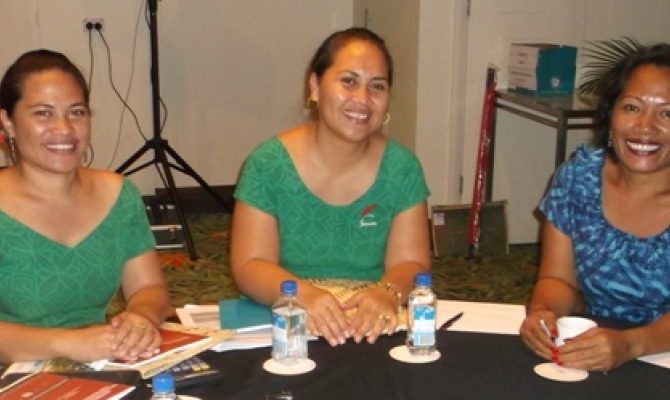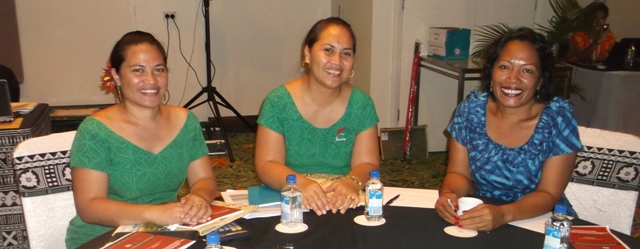
Climate Change Resilience
8 July 2013, Nadi, Fiji - A phrase by Samoa's Ambassador to the United Nation, Afioga Aliioaiga Feturi Elisaia was quoted at a major Pacific climate and disaster meeting in Nadi.
The phrase, "No one has a monopoly on new ideas", was quoted by the Director General of the Secretariat of the Pacific Regional Environmental Programme, David Sheppard in his opening statement at the Joint Meeting of the 2013 Pacific Platform for Disaster Management & Pacific Climate Change Roundtable which officially opened this morning.
Sheppard in his speech emphasised the importance of sharing experiences and knowledge through an integrated approach.
"As Ambassador Feturi of Samoa once mentioned, "No-one has a monopoly on new ideas" - the more we can get together, share experience, develop synergies, the better the outcomes will be for the countries and territories of the Pacific.
The Pacific Islands region is said to be creating history by being the first region in the world to unite to develop and integrated approach to address climate change and disaster risk challenges through an integrated regional framework to replace the current Pacific Islands Framework for Adaptation (PIFACC) and the Regional Disaster Risk Management Framework for Action by 2015.
An agreement between the two parties and the regional intergovernmental mechanisms was initiated in 2011, in their joint effort to reduce the vulnerability of communities to hazards by improving the ability to better anticipate, resist, prepare for, respond to and recover from their impacts.
This week, over 400 participants from across the region that include political leaders, civil society, private sector, government representatives, donors, development partners and the scientific community are deliberating in discussions, events and presentations while formulating the initial process of this important roadmap.
Also here to observe and share experiences are representatives of the Samoa Tourism Authority, who will be observing this week's events and dialogue.

"We are here to observe the initiatives in disaster risk management and climate change at the regional level to help Samoa's tourism sector with its efforts and projects, given the vulnerability of the tourism sector," said Tourism Climate Change Project Coordinator, Amiaifolau Afamasaga Luatua.'
"It is a good opportunity to learn of how the Pacific is positioning itself in an integrated manner in preparing for disasters and associated impacts of climate change, to contribute to development plans of Samoa Tourism in the next five years.
"This is also a golden opportunity to help Samoa Tourism and Tourism Climate Change Taskforce and the wider tourism sector in implementing its climate change projects and most importantly it's National Tourism Climate Change Adaptation Strategy."
Luatua, who is here with the STA Manager of Planning and Development, Christina Leala-Gale said Samoa can also anticipate opportunities for the Small Islands Development States conference due in Samoa next year.
Representing Samoa at the Meeting is CEO for Ministry of Natural Resources and Environment, Taulealeausumai Laavasa Malua, ACEO, Filomena Nelson.
The Joint Meeting of the Pacific Platform for Disaster Risk Management and the Pacific Climate Change Roundtable is from 8 – 11 July and is jointly organised by the Secretariat of the Pacific Community, the United Nations Office for Disaster Risk Reduction and the Secretariat of the Pacific Regional Environment Programme. The meeting is hosted by the Government of Fiji.
The phrase, "No one has a monopoly on new ideas", was quoted by the Director General of the Secretariat of the Pacific Regional Environmental Programme, David Sheppard in his opening statement at the Joint Meeting of the 2013 Pacific Platform for Disaster Management & Pacific Climate Change Roundtable which officially opened this morning.
Sheppard in his speech emphasised the importance of sharing experiences and knowledge through an integrated approach.
"As Ambassador Feturi of Samoa once mentioned, "No-one has a monopoly on new ideas" - the more we can get together, share experience, develop synergies, the better the outcomes will be for the countries and territories of the Pacific.
The Pacific Islands region is said to be creating history by being the first region in the world to unite to develop and integrated approach to address climate change and disaster risk challenges through an integrated regional framework to replace the current Pacific Islands Framework for Adaptation (PIFACC) and the Regional Disaster Risk Management Framework for Action by 2015.
An agreement between the two parties and the regional intergovernmental mechanisms was initiated in 2011, in their joint effort to reduce the vulnerability of communities to hazards by improving the ability to better anticipate, resist, prepare for, respond to and recover from their impacts.
This week, over 400 participants from across the region that include political leaders, civil society, private sector, government representatives, donors, development partners and the scientific community are deliberating in discussions, events and presentations while formulating the initial process of this important roadmap.
Also here to observe and share experiences are representatives of the Samoa Tourism Authority, who will be observing this week's events and dialogue.

"We are here to observe the initiatives in disaster risk management and climate change at the regional level to help Samoa's tourism sector with its efforts and projects, given the vulnerability of the tourism sector," said Tourism Climate Change Project Coordinator, Amiaifolau Afamasaga Luatua.'
"It is a good opportunity to learn of how the Pacific is positioning itself in an integrated manner in preparing for disasters and associated impacts of climate change, to contribute to development plans of Samoa Tourism in the next five years.
"This is also a golden opportunity to help Samoa Tourism and Tourism Climate Change Taskforce and the wider tourism sector in implementing its climate change projects and most importantly it's National Tourism Climate Change Adaptation Strategy."
Luatua, who is here with the STA Manager of Planning and Development, Christina Leala-Gale said Samoa can also anticipate opportunities for the Small Islands Development States conference due in Samoa next year.
Representing Samoa at the Meeting is CEO for Ministry of Natural Resources and Environment, Taulealeausumai Laavasa Malua, ACEO, Filomena Nelson.
The Joint Meeting of the Pacific Platform for Disaster Risk Management and the Pacific Climate Change Roundtable is from 8 – 11 July and is jointly organised by the Secretariat of the Pacific Community, the United Nations Office for Disaster Risk Reduction and the Secretariat of the Pacific Regional Environment Programme. The meeting is hosted by the Government of Fiji.